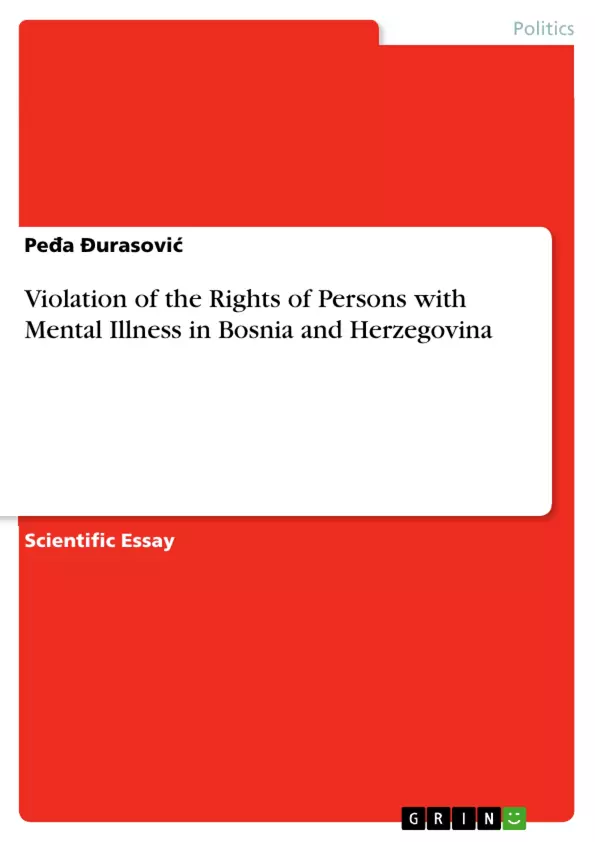On 2 February 2016, the judgement of the European Court of Human Rights in the case of Hadžimejlić and Others against Bosnia and Herzegovina became final. By this judgement, the violation of the applicants’ rights to security and liberty prescribed by the Article 5 of the Convention has been established to be caused by the unlawful detention of the applicants in the social care institutions. After more than a year passed from the date of the judgement becoming final, Bosnia and Herzegovina still face difficulties in adopting an action plan on implementation of the measures posed by the judgement concerned.
Inhaltsverzeichnis (Table of Contents)
- Abstract
- 1 Introduction to the Genesis of Violation of the rights of persons with mental illness caused by the national authorities.
- 2 The violation of the Right to Liberty and Security of Persons with Mental Illness Determined by the Constitutional Court and the European Court of Human Rights
- 2.1 The Constitutional Court's Decisions on the Violation of the Appellants' Rights to Liberty and Security.
- 2.2 The Europena Court's Judgment Regarding the Violation of the Applicant's Rights to Liberty and Security and the Applicable National and International Standards
- 3 Conclusion Regarding the Possible Shortcomings in the Implementation of the Judgement in the Case of Hadžimejlić and Others versus Bosnia and Herzegovina
Zielsetzung und Themenschwerpunkte (Objectives and Key Themes)
This paper examines the violation of the rights of persons with mental illness in Bosnia and Herzegovina, specifically focusing on the case of Hadžimejlić and Others against Bosnia and Herzegovina. It analyzes the European Court of Human Rights’ judgment on the unlawful detention of individuals in social care institutions and its implications for the country's legal framework.
- Deprivation of legal capacity and guardianship for persons with mental illness
- Violation of the right to liberty and security under the European Convention on Human Rights
- International standards and legal frameworks for protecting the rights of persons with disabilities
- Assessment of the shortcomings in the implementation of the European Court's judgment
- Analysis of relevant national legislation and its inconsistencies with international standards
Zusammenfassung der Kapitel (Chapter Summaries)
- Introduction: This chapter establishes the context of the paper by defining mental illness as a recognized disability under international law and highlighting the historical practice of depriving persons with mental illness of legal capacity in Bosnia and Herzegovina. It outlines the procedures leading to the placement of these individuals in social care institutions, primarily through guardianship and administrative decisions based on the Law on Social Protection.
- The violation of the Right to Liberty and Security of Persons with Mental Illness: This chapter focuses on the legal rulings of the Constitutional Court and the European Court of Human Rights concerning the violation of the right to liberty and security for persons with mental illness. It analyzes the specific case of Hadžimejlić and Others against Bosnia and Herzegovina, where the European Court found that the placement in social care institutions constituted a deprivation of liberty. This section also examines the relevant national and international legal standards, including the European Convention on Human Rights and the UN Convention on the Rights of Persons with Disabilities.
Schlüsselwörter (Keywords)
The paper explores the violation of the rights of persons with mental illness, focusing on legal capacity, guardianship, the right to liberty and security, the European Convention on Human Rights, international standards, and the implementation of the judgment in the case of Hadžimejlić and Others against Bosnia and Herzegovina. It examines the shortcomings in the national legal framework and its inconsistencies with international norms.
Frequently Asked Questions
What was the Hadžimejlić and Others v. Bosnia and Herzegovina case about?
The European Court of Human Rights ruled that the applicants' rights to liberty and security were violated due to their unlawful detention in social care institutions without proper legal safeguards.
How does the deprivation of legal capacity affect persons with mental illness in BiH?
Historically, individuals with mental disabilities in Bosnia and Herzegovina were often deprived of their legal capacity and placed under guardianship, which allowed administrative bodies to confine them to institutions indefinitely.
What is the significance of Article 5 of the European Convention on Human Rights?
Article 5 protects the right to liberty and security. The court established that even if a person is placed in a social care home for "protection," it constitutes a deprivation of liberty if they are not free to leave.
What are the challenges in implementing the ECHR judgment in BiH?
More than a year after the final judgment, the country still faces difficulties in adopting an action plan to reform national legislation and align it with international human rights standards.
Does the UN Convention on the Rights of Persons with Disabilities apply here?
Yes, the paper analyzes national legislation in light of international standards, including the UN Convention, highlighting inconsistencies in how Bosnia and Herzegovina protects the rights of disabled individuals.
- Arbeit zitieren
- Peđa Đurasović (Autor:in), 2017, Violation of the Rights of Persons with Mental Illness in Bosnia and Herzegovina, München, GRIN Verlag, https://www.grin.com/document/505393



